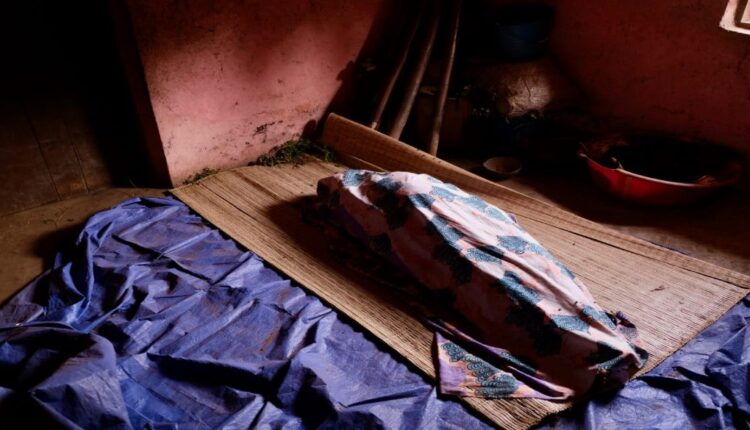CNN reports that Jalloh likely died from severe bleeding in the Bondo bush during a secretive weeks-long initiation into womanhood.
In Sierra Leone, this initiation begins with Female Genital Mutilation (FGM) or Female Genital Cutting.
The body of Salamatu Jalloh lies on a straw mat on the floor of a small, earth-colored room. After the 13-year-old died, police warned villagers not to bury her before a post-mortem could be carried out.
But four days later, in the scorching heat, the corpse continues to lie here, tightly wrapped in a blue and pink cloth, a foot poking out at one end.
“Open the windows,” says a police officer wearing a white surgical mask, as he enters the room. The smell is suffocating. A swarm of flies buzz incessantly over the girl’s face, disrupting her temporary resting place.
The short dirt road through the village of Kabilor, in Kambia district, northwest Sierra Leone, is largely deserted.
Villagers watch solemnly from stoops in front of their mud-brick homes as the police arrive back at the scene, this time accompanied by CNN, the young girl’s father, and a well-known activist, Rugiatu Turay.
“Seeing her decomposing body with flies all over it, and the smell leaves me devastated,” says the father, Mohamed Jalloh, crying inconsolably.
Jalloh’s mother and grandmother took her to the initiation, the officers say. They have now been arrested, along with the Sowei, the woman who leads the ritual and performs the crude operation.
Her father is furious. “I never wanted my daughter to go through Bondo. I am opposed to it,” he says. “I was never informed about it. They just did it on their own. All I was told was about her death and her dead body.”
When the call came about a dead girl, CNN had been meeting with Turay in her hometown about an hour south of the scene.
She is the founder of an organization working to end FGM in Sierra Leone not simply by decrying its harms but by recognizing the value of ritual and offering the community an alternative rite of passage. As a result, she is well known by local anti-FGM activists who alerted her to another tragic death.
“The lifeless body of Salamatu has been here for almost five days and nobody cares,” Turay tells CNN with tears in her eyes. “Whenever I hear that somebody – a child or a woman — died because of FGM, I feel so devastated, I feel so broken. We need to continue talking to save others.”
FGM involves the partial or total removal of the external female genitalia. There are differing numbers from various UN agencies (due to inconsistent data collection in-country) about prevalence rates but the United Nations Children’s Fund (UNICEF) estimates that at least 200 million girls and women in 31 countries have undergone one of four types of FGM.
The practice is said to be happening on every continent, though it is most prevalent in the Arab states and in Africa.
While the outcomes from FGM depend on many different factors, ranging from the skill of the practitioner to the hygiene levels of where it takes place and the general health of the girl or woman undergoing the procedure, cutting can lead to a range of complications.
These include: severe bleeding, problems urinating, menstrual disorders, infertility, and prolonged labor that can result in the death of the fetus.
Sierra Leone has the seventh highest FGM rates in Africa. According to UNICEF, nearly one in ten girls aged 0-14 have been cut (as reported by their mothers) – though, the agency cautions that “the data on prevalence for girls under age 15 is actually an underestimation of the true extent of the practice” as girls remain vulnerable to FGM until they reach customary age, which is 18 in Sierra Leone.
The practice also spans all of Sierra Leonean society: it is done by wealthy and poor people, urban and rural, across religious groups and educational levels.
It is impossible to know how many girls and young women, like Jalloh, die every year in Sierra Leone after undergoing FGM as the Bondo Society is shrouded in secrecy, and silence is maintained through superstition and fear.
A 2017 report into Bondo by Forward a leading African organization working to bring awareness on FGM, revealed that “even talking about the Society, women believe, puts them at risk of ‘curses’ and ‘demons’.”
Source: CNN




Comments are closed.